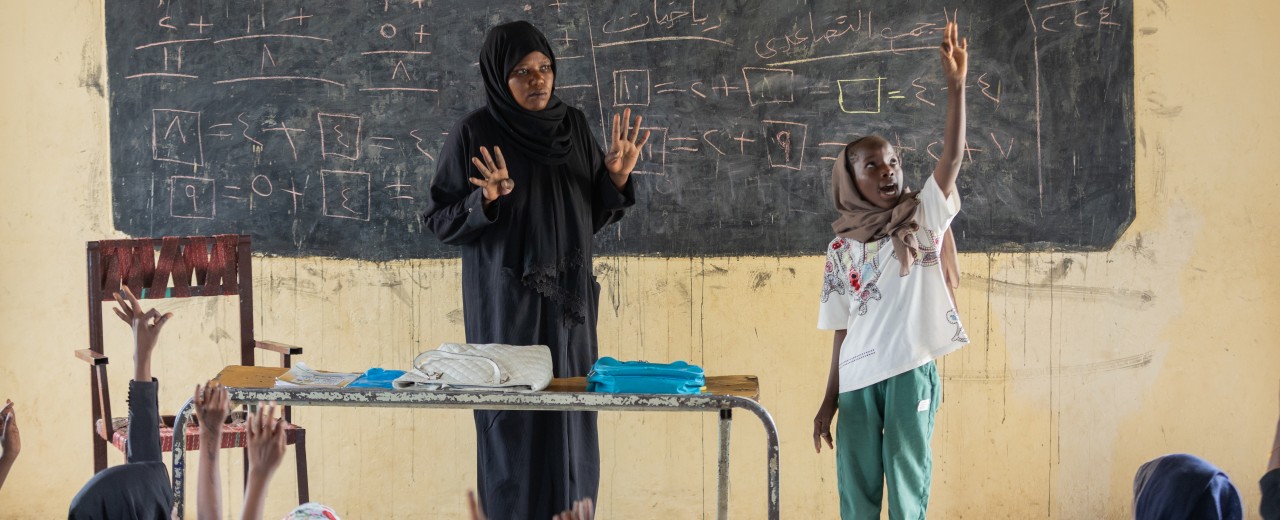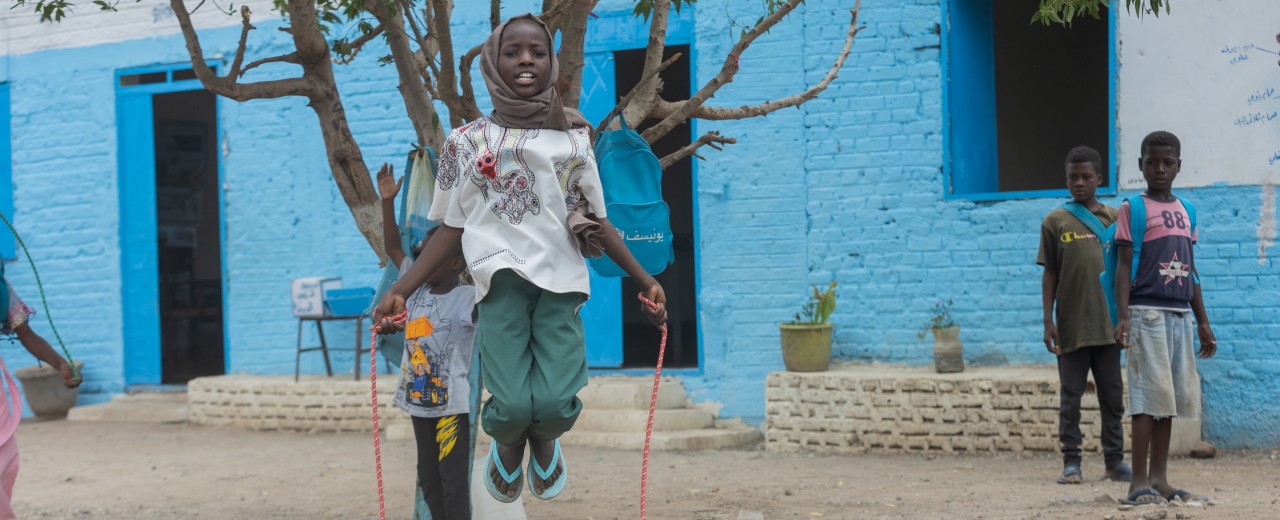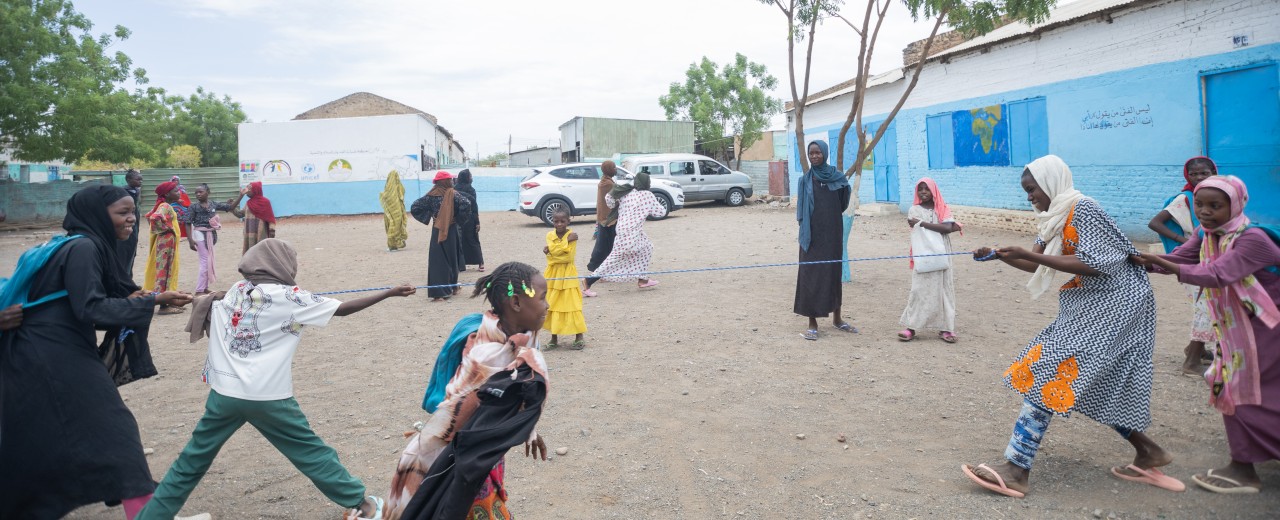Tip: Activate javascript to be able to use all functions of our website

On 9 July 2025, Federal Development Minister Reem Alabali-Radovan gives a speech to the German Parliament. Her message is clear and urgent: Sudan is on the brink of total collapse. But in a world full of crises and big headlines, there is silence about the catastrophe unfolding there. Millions of children have no access to education, clean drinking water or sufficient food. The figures are shocking: twelve million displaced persons and 150,000 civilian casualties. A generation traumatised by war is growing up. And above all, the suspension of USAID aid programmes in February 2025 dramatically exacerbated the hardship in the country.
But as Reem Alabali-Radovan also emphasises, there is hope. German development cooperation is helping to set up places of refuge – the Makannas (Arabic for “our space”) – which currently give 220,000 children in this chaos a chance at education, psychological support and a more stable food situation. This means hope for a good future.
On behalf of the Federal Ministry for Economic Cooperation and Development (BMZ), the KfW Horn of Africa Office is implementing the Makanna project in cooperation with UNICEF. Vulnerable children and young people are given improved access to basic services such as education, WASH and child protection. In the current second phase, a further 240,000 children in new locations in the Red Sea, Kassala and Gedaref regions are being added to the 220,000 children already benefiting from the project. Due to its great success, a third phase is already being planned. There are currently 62 Makannas in operation in the River Nile and Northern State regions. They also offer protection and stability for children who have been separated from their families by war and displacement. And the successes cannot be measured in numbers alone: parents report that the Makanna centres give children a sense of normality amid all the chaos. UNICEF has observed lively participation, especially in learning activities. Above all, the project can achieve one thing for the local children: they know that we have not forgotten them.
Proscovia Nakibuuka Mbonye (UNICEF) tells the story of eleven-year-old Rabha, who fled Khartoum and is attending school for the first time in her life in Makanna October North.
For the first time in her life, 11-year-old Rabha can read, write and do maths. The girl, displaced from Khartoum, sits at the front of the class, listens attentively and takes every opportunity to answer the teacher's questions. At home, Rabha and her siblings attended the religious school, also known as Khalwat, where she mainly learnt the Koran by heart. When she saw her classmates going to school in uniform and with rucksacks, she always wondered why she never had the opportunity to join them. But her mother's answer was always the same: ‘I don't have any money.’
When Rabha from Khartoum came to the UNICEF-supported safe Makanna October North in Gedaref, she had many questions. Here she did many things for the very first time, lovingly accompanied by her favourite teacher Fatima. Here Rabha heard people speak English for the first time; learnt to read, write and count. ‘In her first English lesson, she asked me what this strange language was. She had never heard of it before,’ says Fatima. It was also here that Rabha first received a UNICEF rucksack in which she can keep her books - an item that is very dear to her.
The Makanna, where Rabha feels safe and secure, accommodates over 300 children from host communities and refugee camps every day thanks to the support of German development cooperation through KfW Development Bank. Supported by trained supervisors, the children take part in various activities, including games, theatre, clubs, art and drawing as well as learning methods. Rabha sits with her peers in a small class and listens attentively to the teacher. It has been a long and adventurous learning journey for the girl. In a maths lesson, they learn to count and add. Rabah voluntarily steps forward and counts from one to ten. ‘I like to speak up in class - and when I have the right answers, everyone applauds me,’ says Rabha. Without safe learning spaces like this, Rabha would not have had the opportunity to attend school and learn. ‘When we arrived in Gedaref, they opened the schools for us,’ she says. She reaches for her exercise books, which are safely stowed away in her rucksack. ‘I didn't have a bag in Khartoum, I only had a wooden board and a wooden stick-like pen. But when I came here, I learnt to write in exercise books and on the blackboard.’ As well as learning, Rabha also enjoys sporting activities at the centre. Her favourite game is skipping rope.

When Rabha is not in class, she jumps outside, plays tug-of-war and makes music with friends. Her biggest worry is that she will no longer be allowed to study. Through her teacher Fatima, she has learnt that education can make a crucial difference for children, especially girls. ‘Education is very important to me. I want to learn,’ Rabha emphasises. Although she longs for her homeland, she is tormented by the thought of trading her home for education. She would rather stay in Gedaref to learn. She is proud of the progress she has made along the way. Thanks to the skills and self-confidence she has gained in the clubs, Rabha is unstoppable and already has her future career firmly in her sights: ‘I want to be a teacher, because when I didn't know anything in class, a teacher helped me.’

Share page
To share the content of this page with your network, click on one of the icons below.
Note on data protection: When you share content, your personal data is transferred to the selected network.
Data protection
Alternatively, you can also copy the short link: https://www.kfw-entwicklungsbank.de/s/enzB1wpb
Copy link Link copied